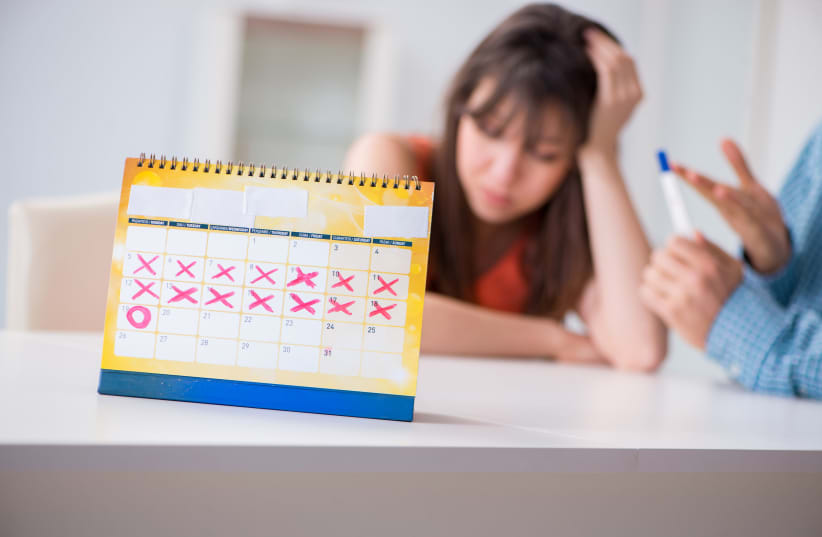Most couples who want to conceive succeed without any problems, but others face challenges.
Some couples try to time the process with home tests to check the exact date of ovulation, but to do this effectively it’s important to understand what ovulation is, what is an ovulation period, the ovulation process and more. This information is also crucial for women who aren’t planning a pregnancy, but want to be more aware of the changing needs of their body throughout the month.
Below we explain the menstrual cycle.
What is ovulation?
Ovulation is when an egg leaves the ovary and enters a fallopian tube. If met by sperm after a couple has sex, which comes through the cervix, the fertilization process of the egg takes place and later the fertilized egg travels, for three do four days, until it reaches the uterus and takes root in it.
What is the period of ovulation?
Ovulation occurs about 14 days before the upcoming menstrual period. For a woman who menstruates every 28 days, ovulation occurs around the 14th day from the beginning of the previous menstrual period In women with longer periods, that is-a woman who menstruates every 32 days, ovulation will occur later, around day 16 to 18 from the beginning of the previous cycle.
When menstruation is irregular, it is extremely difficult to know when ovulation will occur. There are conditions, such as in women with polycystic ovaries, in which ovulation occurs infrequently or not at all, even if they experience monthly bleeding. Irregular bleeding can come from instability of the endometrium and doesn’t necessarily cause ovulation to occur.
Is it possible to get pregnant only on the days of ovulation itself?
Some women believe that their ovulation is on the 12th or 16th day even though their period is every 28 days in an orderly fashion. In these cases it’s important to understand that since sperm cells can live in the vicinity of the cervix and uterus for about 72 hours, and the lifespan of the egg is about 24 hours, this is the optimal meeting time for the woman to become pregnant. That is, they can become pregnant during this time if they have sex, but this does not necessarily mean that ovulation was on the 12th day, but that the sperm was still active in the woman's body and could fertilize an egg when ovulation happens on the 14th day.
That is, having sex up to two days before the time of ovulation or two days after it allows fertilization and conception of pregnancy. This is especially important for couples who want to avoid pregnancy and rely on the safe days method, which is a really inaccurate method.
Accordingly, women who have irregular menstruation, for example once every 35 days, and want to get pregnant, it’s recommended to have sex on a regular basis. After trying for a year, if you’re still not expecting, go to your gynecologist. Women with even more distant periods shouldn’t wait a year until the beginning of the inquiry. Consult a doctor now, because as mentioned, without ovulation one can’t get pregnant.
Also, distant cycles require clarification even when you don’t want to get pregnant, to prevent endometrial disease as you age. Consult a gynecologist regarding pills or treatment that regulates menstruation.
Do you feel the ovulation?
Some women complain of symptoms such as congestion in the breasts and feeling bloating and pain in the lower abdomen even though they aren't menstruating. Before going to the doctor for fear of one disease or another, try to calculate whether you are in the ovulation stage. Some women "feel the ovulation,” meaning they experience pain around the time of ovulation that is to the pain of the menstrual period itself. This is explained by the bleeding, which is very light, which can occur when the egg exits the ovary.After ovulation, the secretion of another hormone called progesterone begins, from the same area in the ovary from which the egg hatched. This hormone prepares the lining of the uterus for the pregnancy to anchor itself, and along with it can cause side effects such as congestion in the breasts, a feeling of bloating of the abdomen and the like.
Are there different secretions during ovulation?
Throughout the cycle until menstruation, and depending on the amount of hormones secreted by the woman, the secretions and their nature varies. After menstruation, with the development of the follicle in the ovary, the level of the hormone estrogen increases. This hormone thickens the lining of the uterus and prepares it for the implanting of the fetus and at the same time increases vaginal secretions that are clear, transparent and watery. After ovulation the nature of the secretions changes to thick and cloudy under the influence of progesterone. As a rule, there are always vaginal secretions, but secretions which are green/yellow color, are mixed with blood or have an unpleasant odor, require examination.
In conclusion, the combination of normal development of the follicle in the ovary, preparation of the uterine lining, ovulation and timed encounter with sperm, migration to the uterus and arrival of the fertilized egg in the uterine cavity at the appropriate time for progesterone rise, are important partners in getting pregnant.
Dr. Einat Shalom Paz is the director of the IVF unit at Hillel Yaffe Medical Center
